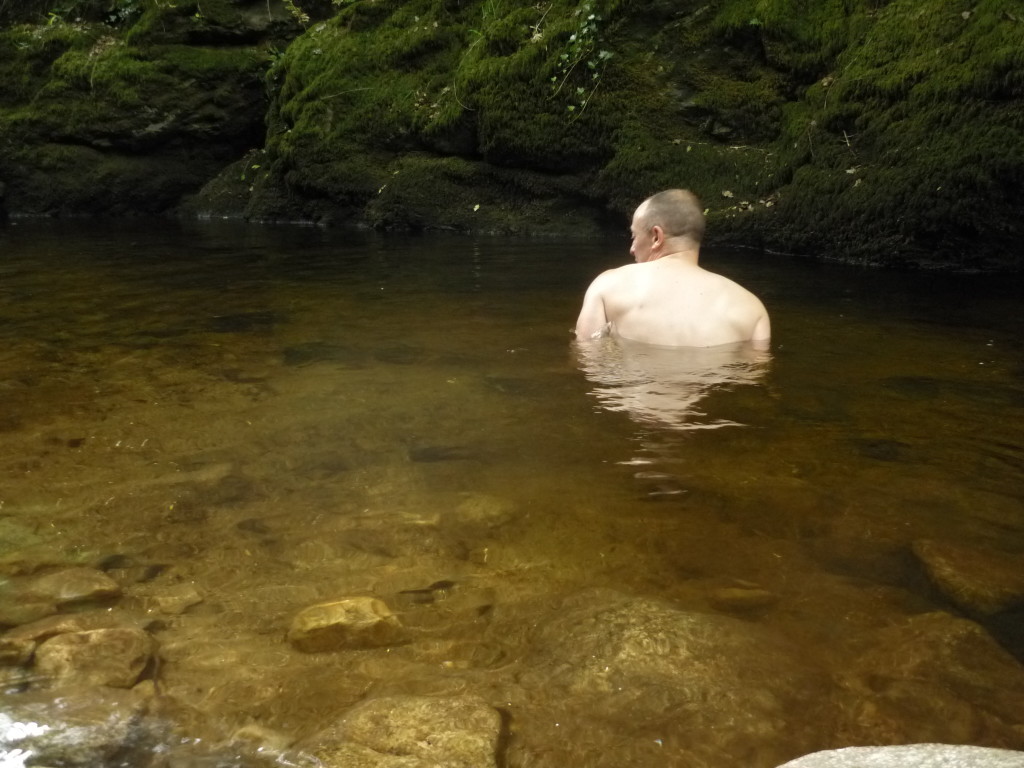By Sean Fagan

Taking a refreshing dip in the cold waters of the Glencullen River, Ireland. The high tannin content of these waters is great for clearing up mild, skin infections (Photo: Sean Fagan).
.
Why Outdoor Swimming & Bathing is Good for You
.
I'm a big fan of swimming and generally splashing about when living outdoors (or "Wild Swimming" as it's often euphemistically labelled these days).
Between insect bites, heat rashes, cuts, scrapes, general dirt and the rest...bathing outdoors is generally healthy for your skin (provided the water is clean).
It's also great for morale, invigorates the body, provides a cooling respite during hot weather, clears the head and lessens fatigue (think of cold-water bathing as nature's coffee).
Personally, I swim outdoors all year round - it's something I greatly enjoy. Occasionally I bring a snorkel (a great way of observing aquatic wildlife such as marine & freshwater fish).
For myself, swimming outdoors is another way of perceiving and enjoying the outdoors.
It's great fun.
. .
Common Hazards of Outdoor Swimming
.
Although swimming outdoors is great fun, it can be potentially hazardous.
.
Here are a few of the most common hazards associated with outdoor swimming...
.
- Swimming outdoors can be quite chilling - even during warm weather.
It's best to stop swimming if an individual is continuously shivering or/and cannot touch, or have difficulty touching, your thumb to the little finger of the same hand (To learn more about the Hypothermic Incapacity Test: Bushcraft Safety: Hypothermia).
- Avoid deep water, especially fast-running, deep water - unless you are a proficient and experienced outdoor swimmer. Even then, be cautious.
- Watch out for uneven, rocky river/stream beds - it can be surprisingly easy to trap your foot between rocks or just as risky - lose your balance and fall over (it helps if you wear gripping footwear - I highly recommend neoprene yacht shoes - cheap and effective).
- When swimming in deep water, stay close to the bank/shore - always be aware of at least two good exit points on the bank BEFORE entering the water. This is especially relevant when swimming in water with steep banks.
- Never jump or dive into water that is unclear.
- Personally, I never swim in water that has passed agricultural land or towns & cities - the risk of pollution is too high. In Ireland, where I live, I tend to swim in upland lakes and rivers/streams and the sea. I avoid wide, lowland rivers and lowland lakes.
When aboard in wilderness regions, I swim a lot - mostly in rivers as they generally have less natural pollution than lakes.
.
Always be aware of this simple fact: when outdoors in wild places - you, and you alone are responsible for your health - always strive to improve your technical competence in outdoor safety in conjunction with honing and trusting your natural instincts to keep safe.
To use a personal example - I once witnessed a friend become seriously chilled when swimming in a river for about 40 minutes on a warm, summers day. A sobering example of outdoor swimming gone awry.
.
One of the benefits of becoming proficient with swimming outdoors is that it's a viable survival skill.
Survival scenarios in remote, wild locations are unpredictable - I can imagine innumerable survival scenarios where the ability to swim well could prove very beneficial, perhaps life-saving.
..
.
HYGIENE TIP: Soap up and rinse off, on dry landWhen cleaning the body with soap - soap up a good distance away from the water's edge (at least 100 metres). Rinse the soap off your body on dry land.
This method of using soap is environmentally kinder on natural bodies of water - especially on more sluggish bodies of water such as lakes - where pollution can easily accumulate.
I always use an antiseptic soap - great for general hygiene and clearing up mild skin infections.
If you can acquire an odourless soap, all theb better - this will help to lessen your scent signature - making you far less detectable by many species of biting insects. It will also hide your scent from wild animals with a keen sense of smell (which is most mammal species) and greatly improve your chance of observing wildlife, undetected.
(As an interesting side note - during the Vietnam war, American special forces soldiers were strongly advised not to use soap during covert operations - as the Vietnamese soldiers were adept at detecting the distinctive scent of soap in the jungle).
.
"Live in the sunshine, swim the sea, drink the wild air"
Ralph Waldo Emerson
.
Related articles on this website:
.
Link:
Recent Comments